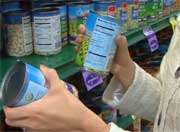(HealthDay)—About $3 billion in health costs in 2008 could be attributed to bisphenol A (BPA) exposure, and removing BPA from all food uses could save nearly $2 billion annually, according to a study published online Jan. 22 in Health Affairs.
The U.S. Food and Drug Administration has banned the use of BPA in baby bottles and sippy cups but not in other food uses. Leonardo Trasande, M.D., from the New York University School of Medicine in New York City, quantifies the potential disease burden and costs associated with BPA exposure in 2008 and models the potential health and economic benefits of replacing BPA in all food uses.
The author estimated that, in 2008, 12,404 cases of childhood obesity, 33,863 cases of newly incident coronary heart disease, and $2.98 billion in social costs could be attributed to BPA exposure. Removing BPA from all food uses could prevent 6,236 cases of childhood obesity and 22,350 cases of newly incident coronary heart disease annually, with potential annual economic benefits of $1.74 billion.
"Although more data are needed, these potentially large health and economic benefits could outweigh the costs of using a safer substitute for BPA," Trasande concludes.
More information:
Abstract
Full Text
Journal information: Health Affairs
Copyright © 2014 HealthDay. All rights reserved.




















